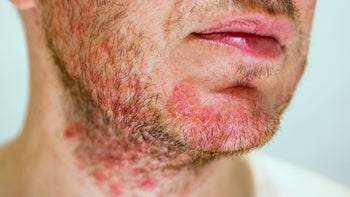
Is Eczema an Autoimmune Disease?
Key takeaways:
Eczema is a chronic skin condition that shares some similarities with autoimmune skin diseases. By strict definition, eczema isn’t an autoimmune condition. But there’s a close link between the two.
People with autoimmune conditions that involve the skin are more likely to have eczema. And people with eczema are more likely to develop autoimmune conditions.
The immune system is involved in eczema flare-ups, so medications that target the immune system are helpful.

Eczema (atopic dermatitis) is a very common skin condition that can cause a very itchy rash. It’s not clear exactly what causes eczema, but helpful treatments often aim to lower the immune system response. This is often the same type of treatment for certain autoimmune diseases, like lupus or psoriasis.
Eczema and autoimmune skin conditions are closely linked. But experts are still trying to understand the nuances of the relationship. Even though eczema has some features that are similar to autoimmune conditions, there are key differences.
What is eczema?
Eczema is a chronic skin rash marked by lots of inflammation. Anyone can get eczema, but more children get diagnosed with it. It can range from very mild to severe. And the symptoms can sometimes be so intense that they affect your quality of life.
Experts don’t know the exact cause of eczema, but it’s likely due to multiple factors. There are genetic causes of eczema as well as causes from your environment.
Genetic factors
A genetic cause for eczema may occur when a part of the skin — filaggrin — doesn’t work properly. Filaggrin plays a role in the skin’s defense against intruders. It’s part of the skin barrier at the surface of the skin. It acts like a glue to help keep things out of the skin and to keep moisture in.
When filaggrin isn’t working properly, the skin barrier falls apart. This can lead to:
An inability to keep skin moist
Very dry skin
An easy entry for irritants, allergens, and bacteria
Does weather affect eczema? Yes, cold and dry air can trigger eczema. Learn how to prevent winter eczema flares.
Eczema vs. psoriasis: It can be easy to confuse eczema and psoriasis, two long-term skin conditions that can cause patches of flaky skin. Learn the key differences.
What is scalp eczema? Scalp eczema can lead to a dry, itchy, or flaky scalp. And it can be quite uncomfortable. Learn about the different types and treatments.
These effects can lead to chronic eczema flares and inflammation in the skin. When eczema occurs during childhood, genetic causes may be involved.
Environmental factors
Environmental causes can lead to eczema that develops or worsens in adulthood. These eczema causes include:
Skin irritants (detergents or heavy fragrances)
Allergens (pet dander or dust)
Very dry or cold air
Overwashing
Stress
Many people who have eczema also have asthma, as well as environmental allergies to dust and grasses.
What is an autoimmune disease?
An autoimmune disorder is a condition where your immune system mistakenly attacks something in your own body. This attack can happen in your skin or the organs inside your body.
Normally, the immune system has a great filter to know what in the body belongs and what doesn’t. For example, when you get sick, your immune system can find the germ and destroy it. The immune system also has a memory. So, if you get the same bug again, it may recognize it faster.
But the immune system doesn’t always work properly. Instead of attacking an intruder, it mistakenly attacks part of your own body.
For example, Type 1 diabetes is an autoimmune disorder. In this condition, the immune system attacks specific cells in the pancreas that help make insulin. When these cells are destroyed, the pancreas can no longer make insulin — leading to the lifelong need for insulin replacement.
Is eczema an autoimmune disease?
The simple answer is — no. Eczema isn’t an autoimmune disorder, but the two conditions are closely linked. In eczema, the immune system isn’t attacking a specific target in the skin or the body. This is a key feature that defines an autoimmune disease.
That said, there are certain parts of the immune system that may be overactive in eczema. These are called “inflammatory factors.” That’s why certain medications that suppress the immune system also help improve eczema.
But the immune system is only part of the story when it comes to developing eczema. Genetic and environmental factors are also at play, and this sets it apart from autoimmune diseases.
Research shows that people with autoimmune conditions are more likely to develop eczema. This is especially true of autoimmune conditions involving the skin and gastrointestinal system. The more autoimmune diseases you have, the stronger the risk.
Examples of conditions that may put you at greater risk of eczema include:
Alopecia areata
Vitiligo
Inflammatory bowel disease (like Crohn’s or ulcerative colitis)
Celiac disease
And this is a two-way connection. People with eczema are also more likely to develop certain autoimmune disorders, like:
Sjögren’s syndrome
Inflammatory bowel disease (like Crohn’s disease or ulcerative colitis)
Hypothyroidism
Researchers continue to study more about the connection between eczema and autoimmune conditions. There’s still more to learn about the link between the risk factors and the treatment for eczema and autoimmune diseases.
When should you see a healthcare professional about eczema?
If you notice signs of eczema or any skin changes, schedule a checkup with your primary care provider or dermatologist. And if you have a history of autoimmune conditions, be sure to let your healthcare team know. This can help them figure out if you have eczema or another skin condition, such as ringworm, psoriasis, or scabies.
There are many treatments for eczema that work well to manage symptoms. From medications to home remedies, a healthcare professional can help you figure out the next best steps.
Frequently asked questions
No, eczema isn’t contagious. There’s no way to “catch it” from someone else. Eczema is the result of genetic and environmental factors.
No, there’s no cure for eczema. But keep in mind that there are many treatment options that work well to lessen symptoms.
Yes, dry and cold air can lead to eczema flares, which can feel very itchy. In the U.S., these weather conditions tend to happen in the winter season. You can help prevent winter eczema flare-ups on your hands by wearing gloves when you go outside, washing your hands only when necessary, and using thick moisturizer.
The bottom line
Eczema is a chronic skin condition that involves inflammation of the skin. While the immune system is involved in eczema flares, it’s not defined as an autoimmune condition. That’s because there are other genetic and environmental factors that lead to eczema.
But there’s a strong link between eczema and autoimmune diseases. Having eczema can put you at risk for developing an autoimmune condition. And having an autoimmune condition can make it more likely for you to develop eczema. Let your primary care provider know if you have concerns about your risk for eczema or an autoimmune condition.
Why trust our experts?



References
American College of Allergy, Asthma & Immunology. (2023). Eczema.
Brown, S. J., et al. (2012). One remarkable molecule: Filaggrin. Journal of Investigative Dermatology.
Cipriani, F., et al. (2017). Autoimmune diseases involving skin and intestinal mucosa are more frequent in adolescents and young adults suffering from atopic dermatitis. The Journal of Dermatology.
de Lusignan, S., et al. (2022). Atopic dermatitis and risk of autoimmune conditions: Population-based cohort study. The Journal of Allergy and Clinical Immunology.
Ivert, L. U., et al. (2021). Association between atopic dermatitis and autoimmune diseases: A population-based case-control study. The British Journal of Dermatology.
Lu, Z., et al. (2021). Atopic dermatitis and risk of autoimmune diseases: A systematic review and meta-analysis. Allergy, Asthma & Clinical Immunology.
van der Hulst, A. E., et al. (2007). Risk of developing asthma in young children with atopic eczema: A systematic review. Journal of Allergy and Clinical Immunology.

























